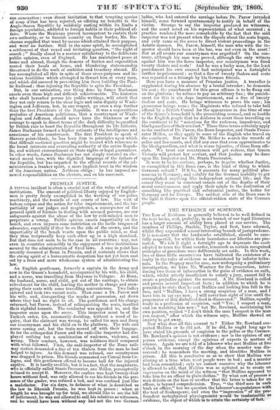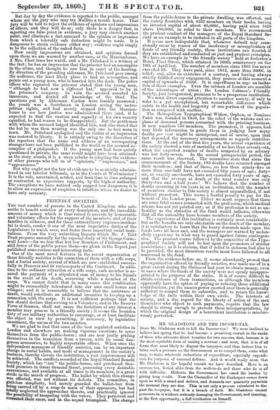THE IVIDENCE OF SUSPICION.
THE Law of Evidence is generally believed to be well defined in the text books, and, probably, in no branch of our legal literature has a larger amount of ability been placed at our service. The treatises of Phillips, Starkie, Taylor, and Best, have adorned, whilst they expounded a most interesting branch of jurisprudence. It is necessary that the landmarks established, should be care- fully respected, for within their boundaries our liberties are pro- tected. We felt it right a fortnight ago to deprecate the mode adopted to trace the Road murder, inasmuch as certain recognized principles of procedure were deliberately set aside. In this week, two or three little occurrences have indicated the existence of a laxity in the rules of evidence as administered by inferior tribu- nals. In the Stepney murder case, now undergoing a preliminary investigation, we have Mr. Wontner for the prosecution, intro- ducing two items of information in the guise of evidence on oath, which, whilst utterly insufficient to satisfy a jury, cannot fail to create a prejudice against the accused. A Mr. Rowland is called and proves several important facts ; in addition to which he is permitted to state that he met Mullins and looking him full in the face, said " Mullins, I have a strong suspicion of a man, and I have him in my eye now. I will never lose sight of him until the perpetrator of this diabolical deed is discovered." Mullins, equally ready in a profession of suspicion, said " Yes ; I suspect a man, and am watchinnb him now ; but Mr. Rowland, maintaining his own position, replied " I don't think the man I suspect is the man you suspect," after which the witness says, Mullins showed an anxiety to get away. Now what does all this amount to ? Either Mr. Rowland sus- pected Mullins or he did not. If be did, he ought long ago to have stated his grounds of suspicion to the police or the Coroner. Mr. Rowland's opinion is not evidence; nor is the opinion of any person evidence, except the opinions of experts in matters of science. Ann•ain we are told of a labourer who met Mullins at flee o'clock in the morning of the day when the murder was dis- covered ; he remembers the meetang, and identifies Mullins in prison. All this is conclusive so as to show that Mullins was stirring at a time when most people were in bed ; and a murder had been committed; only we cannot conceive why the labourer is allowed to add, that Mullins was so agitated as to create an impression on the mind of the witness "that Mullins appeared to take him for an officer in plain clothes." By what sort of process a man detects on the face of another that the latter is taken for an officer, is beyond comprehension. True, " the thief sees in each bush an officer," but we question the labourer's acquaintance with the text of Shakespeare, and even the " impression" of the pro- foundest Metaphysical physiognomist would be inadmissible as evidence, the object of which is to attain the certainty of fact. But day by day the evidence is reported to the public, amongst whom are' the jury who may try Mullins a month hence. That jury will be told to reject the evidence of opinions and impressions of others, and they, will do so ; only there is a danger that, in rejecting one false point in evidence, a jury may stretch another point, and eliminate a fact annexed to the opinion or impression from which a tolerably safe deduction might be made. It is dangerous to strain evidence either way ; evidence ought simply to be the collection of the naked facts.
How easily impressions are obtained, and opinions formed upon them we are warned by another case, at the Mansionhouse. Mrs. Fleet loses her watch, and a Mr. Pritchard is a witness of the fact; he has an impression that the prisoner had an accomplice in the dime, and thought he saw him in court at the hearing. By direction of the presiding alderman, Mr. Pritchard goes among the audience, the least likely place to find an accomplice, and points out a young man, who is hurried into the dock. The police officer who captured the prisoner stated that the young man, " although he had now a different hat," appeared to be in the prisoner's company. In vain the accused asserted his innocence, and denied all knowledge of the thief. The questions put by Alderman Carden were frankly answered ; the youth was a Scoteliman in London seeing the metro- politan sights, and had merely stepped into the Mansion- house to see how justice was administered there (and, if he expected to find the caution and sagacity of his own country equalled, he had reason to be disappointed). But the gentleman with whom the accused lodged identified him, and also stated that the hat he was then wearing was the only one he had worn in town. Mr. Pritchard apologized and the victim of an impression was restored to liberty. It is entirely owing to the discretion of the reporters that the name and address of an unsuspecting stranger have not been published to the world as the accused ac- complice of a pickpocket. If theyoung man hail been quietly questioned in private, the same result might have been attained; as the story stands, it is a stern rebuke to adopting the evidence of other persons who tell us of "opinions," "impressions," and "appearances." But why ought not the law of evidence to be as strictly adminis- tered in our inferior tribunals, as in the Courts at Westminster ? It is the rule, ascertained, settled, and from time to time enlarged or contracted as experience suggests, by the highest authority. The exceptions we have noticed only suggest how dangerous it is to allow an expression of suspicion to interfere where we desire to have only certainty.



























 Previous page
Previous page